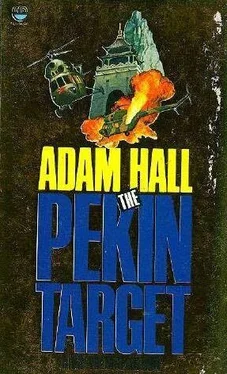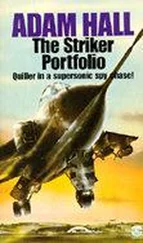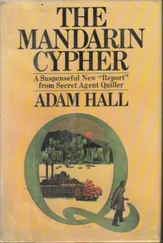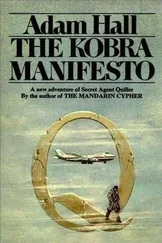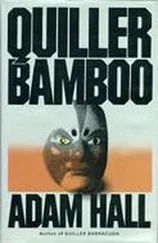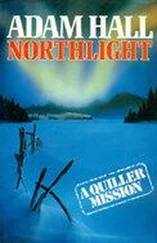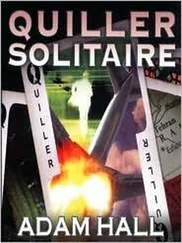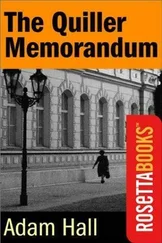"Civil of them."
"We think you've got a good chance of getting through to Tung Kuo-feng, otherwise we wouldn't ask you to go. Croder's discussed a dozen other options including a low-level bombing raid, but the best chance we've got is by putting one man in by stealth, a man with your proven capabilities."
"Then send me in alone."
"You mean without de Haven?"
"Yes."
"She'll be with you only until you sight the monastery from the ground, unless you need her help after the drop. She's led climbing expeditions right across this country and she speaks fluent Korean."
"How will she get out?"
"You'll be given a final joint briefing before take-off."
I turned to stand with my back to the stuff in the corner; it was tempting me: I wanted to go in, despite the increased risk, and that wasn't intelligent. "What can you do to find out if Li-fei was made to talk?"
"Almost nothing. I've got Youngquist working on it, with five or six agents in place; but all they can do is hope for luck in tracing her movements from the time she left you — finding people who might have seen her or talked to her during that blank time period."
"Who's going to make the final decision?"
"London. Providing you agree to go in if they ask you to."
"I shall agree."
"You may want time to think."
"No."
Because Tung would have to be stopped: he'd already gone too far. He had ordered six killings and Li-fei's wouldn't be the last; and since I'd seen the photograph of the pretty Chinese girl in the newspaper I had wanted urgently to meet Tung Kuo-feng, the diabolus whose hand had reached out from the mountains to guide the sword that had struck across that delicate porcelain neck.
"We're not looking for personal reasons," Ferris said. "We're not mounting a vendetta."
I suppose he sensed my mood; or maybe he thought that Soong Li-fei had meant more to me than she had. But how much does a girl have to mean to you before you're ready to destroy the man who took her head from her body?
"What reasons are you looking for?" I noticed that my tone wasn't all that pleasant.
"We're running a mission. We're asking you to carry out a technical operation, an exercise in logistics. It's the only way you'll get through."
"That's the trouble with London. You're not meant to have a soul. You're meant to be a bloody machine. But just for your information, when I go in it'll be for my own reasons, and there's nothing you can do about that. Nothing at all."
An orderly woke me at 2 a.m. and I reported to the control tower as instructed.
London must have decided. I couldn't ask Ferris because he wasn't here. At 02:15 they put de Haven and me into a transport plane and we landed at Daegu fifty minutes later, 150 miles south-east of Seoul. The night was clear and windless. Ferris was there.
The briefing was summary; the main points had been gone over before. Ferris was perfectly calm, but that didn't mean a thing. Helen de Haven had withdrawn into herself; either she was feeling tension or had dismissed me as a boor and had no inclination to talk. We left the briefing room at 03:46 by the clock on the wall and walked onto the tarmac, already strapped into our chutes.
"Hold it," Newcomb said, and we stopped. He went ahead of us to join Ferris and Lieutenant Lewes. It was almost dark in this area: they must have switched off the tarmac lights.
I said to de Haven: "Did they tell you what our chances are?"
She looked up at me in the faint light. "They didn't give me any actual figures."
"Did they tell you we might be dropping into gunfire?"
She was quiet for a moment. "They used the expression ‘extremely hazardous.' Does that fit?"
"Yes. As long as you know."
"All I know is, you don't want me on this trip. But I'm hard to scare. Sorry."
A figure was moving across the tarmac to our right, towards the buildings. "Put those goddamned lights out."
"The thing is," I told the girl beside me, "that the people I work for happen to use human beings as machines. They're not terribly concerned that in twenty minutes from now there could be two dead bodies hanging from parachutes over the Korean mountains. I just want to make sure they didn't sell you short."
The man was shouting again. This time someone called an answer.
"If there's a chance for you," she said, "there's a chance for me."
"It's not a big one; but I've got my reasons."
"And so have I."
Then the lights over the dispersal bay went out, and we followed Newcomb's flashlight towards the plane.
Newcomb was using the omni stations at Seoul and Sogcho and at 04:07 he came back from the flight deck as we felt the airspeed slackening off.
"Five minutes," he said. "Everything okay?"
"What's our altitude?" de Haven asked him.
"We're coming down from seven thousand now and we'll be running in at three five." He crouched in the aisle between the seats, looking at us in turn. "The moon's at one o'clock, seventy degrees. I'm going to put you down to the west of the target point by an estimated mile. You won't be silhouetted against the moon to anyone watching from the monastery."
The pale blur of de Haven's face was turned towards me in the gloom; the interior lights were out, so that our eyes could accommodate for moonlight. "All right, Clive?"
"Except for the altitude."
"Except for the altitude," she said, "all right?"
I looked at Newcomb. "What's the estimated ground wind?"
"Up here we're in still air. It should be the same on the ground."
I twisted over on the twin seats and looked down through the cabin window and saw only patches of dark and light: the mountains and the mist between them. Where we were going in was mountainside but not steep. The slope was ridged, narrow terraces across loose rock slope. Newcomb straightened up and went forward to the flight deck.
We were gradually losing height, and the airframe sent panels creaking as it flexed. Newcomb had forgotten to shut the door to the flight deck and its low-key illumination was in our eyes. I got up to go forward just as he remembered.
"Sorry.
"That's all right."
The panel of light narrowed and went out.
"Did you see that cartoon?" de Haven asked me.
"Which one?"
"It was in a flight magazine at the base. A picture of a sky-diving team: they'd just linked hands together after free fall, in a nice neat circle, and one of them was talking to the man next to him, you know, in the caption. He was saying: 'You should have thought of that before we jumped!' Is that your kind of funny?"
"Yes." I laughed for her, but it sounded false. The only caption I'd seen at the base just gave the name under the photograph: Soong Li-fei.
If they had made her talk, there'd be a night watch mounted at the monastery and it wouldn't matter if we went down on the blind side of the moon or not.
A crack of light came, forward.
"Two minutes."
Still losing speed and altitude; it felt more like an approach. Lewes had told us we could cut the engine sound by almost half, this way.
De Haven got to her feet, clumsy under the weight of the parachute. "The captain would like to thank you for travelling USAF, and we hope you'll join us again on your next trip.
"Not if you serve that chocolate mousse again. You know what I thought it really was?"
She gave a quick dry laugh and the door of the flight deck opened and I went first down the aisle.
"One minute."
We checked our harnesses, settling the webbing.
Slight pressure under our feet: Lewes was levelling out.
"Thanks for everything," de Haven said; her voice sounded forced, a fraction too loud.
"You're very welcome," I heard Newcomb say; then he swung the door lever and suddenly there was the empty night sky and I went out first as we'd agreed.
Читать дальше
